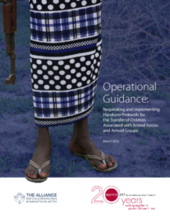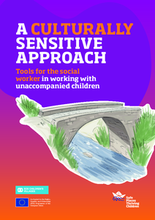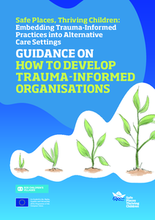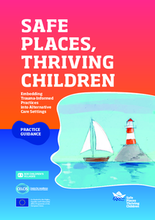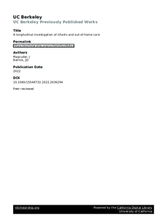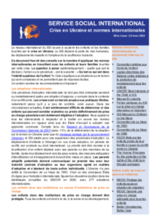Displaying 741 - 750 of 4401
A joint endeavor of Watchlist on Children and Armed Conflict, the Alliance, and its CAAFAG Task Force, the operational guidance aims to support the signing and implementation of handover protocols. It provides child protection actors with good practices, lessons learned, and other useful information on previous and ongoing negotiations and implementation processes in various countries.
Forgotten in the calls for a “new normal” and the shuffle toward it are the millions of children around the world whose parent or guardian has died from Covid-19. Their post-pandemic lives will be anything but normal.
This resource was developed by SOS Children's Villages Belgium as an annex to the Practice Guidance. This tool provides guidance for social workers working with unaccompanied refugee and migrant children on how to use trauma-informed practices in a culturally sensitive way.
The Guidance Document was developed to support organisations taking part in the Organisational Development workshops for the project. Through the workshops, we aim to establish a trauma-informed culture in organisations that care for and support children and young adults in alternative care.
As part of the “Safe Places, Thriving Children” project, SOS Children’s Villages has developed a series of six e-learning modules which aim at increasing participants’ understanding of trauma and its effects on children and young people, and provide guidance on how to act in a more trauma-sensitive way when working with children, young people and families.
The Practice Guidance was developed by CELCIS and SOS Children’s Villages as a resource for participants taking part in the “Safe Places, Thriving Children” training. The purpose of this guidance is to improve understanding and practice in relation to working with children and young adults who live in alternative care settings and who may have experienced trauma.
This study offers a longitudinal examination of a population-based cohort of infants born in 2001 who entered care during the first year of life and who were followed through multiple care episodes until age 18. Findings suggest that using single, first episode data overstates the proportion of children who successfully reunify and understates the proportion of children who are adopted, return to care, or live with guardians.
Schools in 23 countries, with 405 million pupils, are still partially or fully closed because of Covid, the United Nations Children's Fund says.
Ce document fournit des conseils sur la manière d'appliquer les normes internationales lorsque vous travaillez avec des enfants et leurs familles touchés par cette crise. La question à poser, systématiquement - quelle que soit la décision, l'action ou le processus - est "qu'est-ce qui est dans l'intérêt supérieur de l'enfant?" Cela s'applique à des situations sur le terrain qui sont complexes et ne permettent pas de réponses faciles.
Este documento brinda orientación sobre cómo aplicar los estándares internacionales cuando se trabaja con niños y sus familias afectados por esta crisis. La pregunta que se debe hacer, de manera consistente, sea cual sea la decisión, acción o proceso, es "¿qué es lo mejor para el niño?" Esto se aplica a situaciones sobre el terreno que son complejas y no permiten respuestas fáciles.

